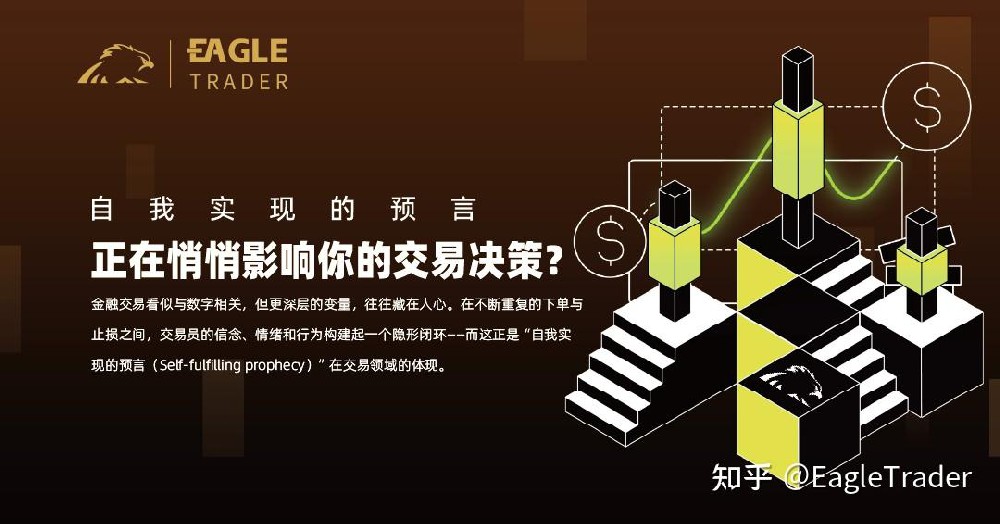Self-fulfilling prophecies are quietly affecting your trading decisions?
- 2025年7月29日
- Posted by: Eagletrader
- Category: News
Financial transactions seem to be related to numbers, but deeper variables are often hidden in people’s hearts. Between repeated orders and stop loss, traders’ beliefs, emotions and behaviors create an invisible closed loop – and this is the “self-fulfilling prophecy” (Self-fulfilling)
Prophecy)” is reflected in the trading field.

This psychological phenomenon is not an empty theory, but the underlying logic that truly affects the trading results!
Is technical analysis a kind of “collective self-realization”?
Let’s first look at a common market phenomenon: when a large number of traders rebound or break through near key technical positions (such as a certain trend line, key support) and build positions one after another, the prices often really run as expected.
This is not because the technical indicators themselves are magical, but because the collective beliefs of traders guide the market behavior themselves—
Belief → Action → As a result, it constitutes a classic “self-realization”.
Therefore, technical analysis does have a “belief effect” in some market environments. It does not predict the future, but captures the “position where consensus may appear” and formulates a probability strategy.
But at the same time, we must also realize that:
Technical analysis is not omnipotent. Factors such as macro fundamental changes, liquidity shocks, and institutional position adjustments can often break this The coherence of some “graphic beliefs”. Therefore, the complete attributing technical analysis to “self-fulfilling prophecies” is actually a simplification of the complexity of the market.
How negative expectations quietly influence your operations
Compared with market trends, what is easier to be controlled by self-fulfilling prophecies is the trader’s own behavior and judgment.
Common negative psychological patterns include:
After continuous losses, self-doubt increases, “I will be wrong again next time” → Missed high-quality opportunities;
Floating losses occur, expecting “this order may have to stop loss again” → Close positions early or wrongly hedging;
Lack of confidence in profitable positions, repeatedly staring at the market, frequently adjusting positions → unable to establish a continuous strategy.
These seemingly “behavioral reactions”, are actually triggered by belief. Belief is often the result of your past experience + short-term emotions. If this negative prophecy cycle continues, the trading system will gradually fail, and traders will fall into a state of collapse in execution.
The premise of positive belief is structured cognition and system
The then, positive “self-fulfilling prophecy” can really help us improveIs the transaction success rate? The answer is: Yes, but the premise is that beliefs are based on systems and logic.
It is not enough to rely solely on “I believe I can do it”. A truly effective trading belief comes from:
trust in the verifiability of the trading system;
rational acceptance of retracement and fluctuation;
knowledge of independence of each transaction;
understanding and execution of long-term return probability.
In other words, the “self-realization” of beliefs is not based on imagination, but on structural support.
Building a practical field for systematic beliefs
In real trading, the reason why many traders find it difficult to establish positive operating beliefs is not because they don’t work hard, but because they lack an environment that can stably exercise execution and systematicity. The self-operated trading assessment mechanism set up by EagleTrader just provides such a transitional space: under the premise of no capital risk, traders can focus on systematic training;
The scale of funds has the opportunity to expand, and the psychological pressure brought by gradually increases, which helps test and polish the stability of beliefs;
The risk control mechanism is clear, and objective data feedbacks the real performance, helping traders break out of subjective judgment misunderstandings;
After entering the profit-sharing stage through assessment, traders will examine risks and returns from a more professional perspective.
This is a typical path of “structural first, beliefs come first”: verify the system in the framework and build self-confidence in practice.
The success of a transaction is never “guessing the right direction” at a time, but whether you can not be defeated by yourself most of the time. Beliefs guide behavior, and behavior determines the outcome. What you believe, what you expect, what you repeat will eventually become part of your trading curve. Trading psychology is not metaphysics, but it will be the entrance to all your behavioral logic.
